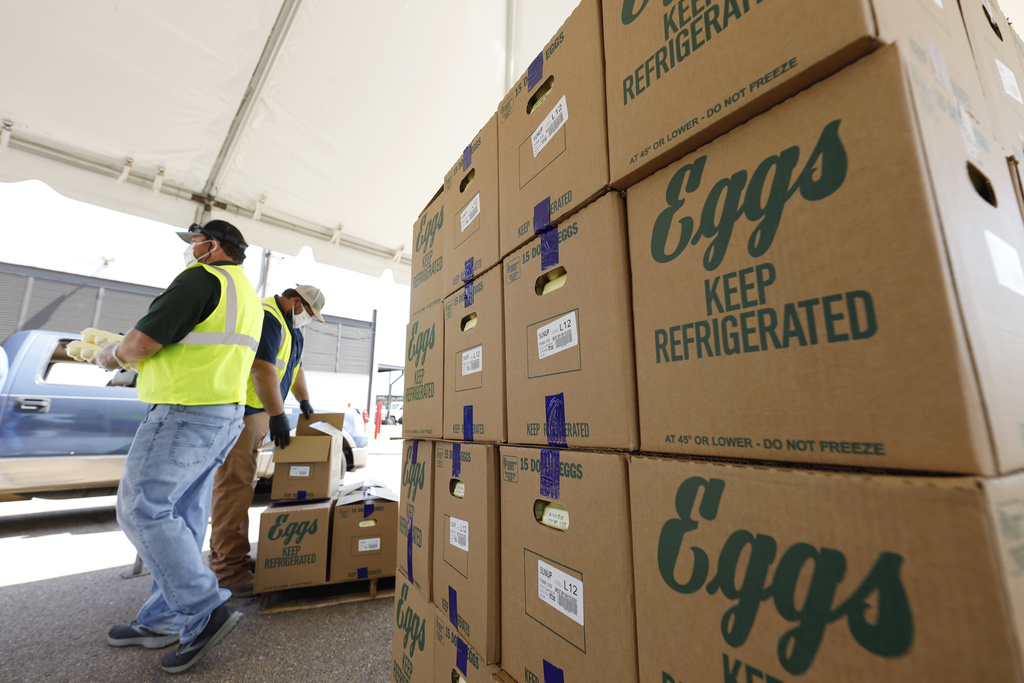The largest producer of fresh eggs in the U.S. said Tuesday it had temporarily halted production at a Texas plant after bird flu was found in chickens, and officials said the virus had also been detected at poultry facility in Michigan.
In Texas, Ridgeland, Mississippi-based Cal-Maine Foods, Inc. said in a statement that approximately 1.6 million laying hens and 337,000 pullets, about 3.6% of its total flock, were destroyed after the infection, avian influenza, was found at the facility in Parmer County, Texas.
The plant is on the Texas-New Mexico border in the Texas Panhandle about 85 miles (137 kilometers) southwest of Amarillo and about 370 miles (595 kilometers) northwest of Dallas.
“The Company continues to work closely with federal, state and local government officials and focused industry groups to mitigate the risk of future outbreaks and effectively manage the response,” according to the statement.
“Cal-Maine Foods is working to secure production from other facilities to minimize disruption to its customers,” the statement said.
The company said there is no known bird flu risk associated with eggs that are currently in the market and no eggs have been recalled.
Eggs that are properly handled and cooked are safe to eat, according to the U.S. Department of Agriculture.
The announcement by Cal-Maine comes a day after state health officials said a person had been diagnosed with bird flu after being in contact with cows presumed to be infected, and that the risk to the public remains low.
In Michigan, Michigan State University’s Veterinary Diagnostic Laboratory has detected bird flu in a commercial poultry facility in Ionia County, according to the Michigan’s Department of Agriculture and Rural Development.
The county is about 100 miles (161 kilometers) northwest of Detroit.
The department said it received confirmation of the disease Monday from the lab and that it is the fourth time since 2022 that the disease was detected at a commercial facility in Michigan.
Department spokesperson Jennifer Holton said Tuesday that state law prohibits the department from disclosing the type of poultry at the facility in Ionia.
The facility has been placed under quarantine and the department does not anticipate any disruptions to supply chains across the state, Holton said.
The human case in Texas marks the first known instance globally of a person catching this version of bird flu from a mammal, federal health officials said.
Dairy cows in Texas and Kansas were reported to be infected with bird flu last week — and federal agriculture officials later confirmed infections in a Michigan dairy herd that had recently received cows from Texas. A dairy herd in Idaho has also been added to the list after federal agriculture officials confirmed the detection of bird flu in them, according to a Tuesday press release from the USDA.
The company said Cal-Maine sells most of its eggs in the Southwestern, Southeastern, Midwestern and mid-Atlantic regions of the United States.
(AP)












6 Responses
They have to stop killing chickens who get this harmless virus. Are we going to kill humans who have the flu too??
There is very little risk to humans and the virus is common and widespread. Culling millions of chickens a year is wasteful, unnecessary and expensive.
Must be an anti-Semitic plot to coincide this with pesach prep.
To prepare for the Kosher for Passover Production.
A different variety of Avian flu has transferred from wild birds to cattle/cows in several Western states, and at least 3 cases have been transferred from the animals to humans. Probably too early to start some conspiracy theory but stay tuned.
This has been looming for well over 1 year after it was found that wild birds can transmit the virus to domestic flocks and the info was well covered by a variety of news outlets. No surprises here.
Just dont buy eggs, let them get stuck with their $7 for a dozen trays and the price will drop like an anvil